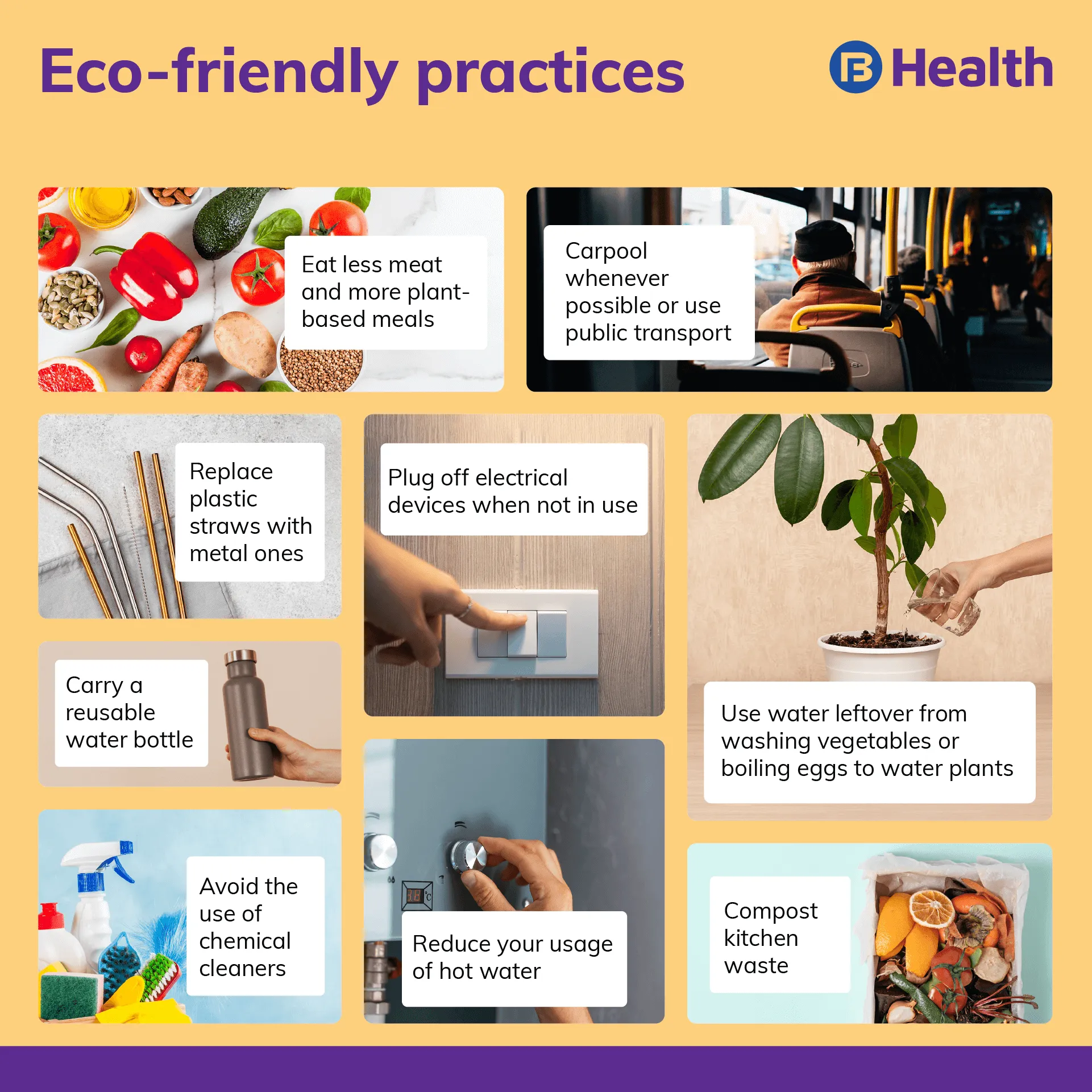General Health | 5 min read
Go Green! The Reason Behind the Importance of World Environment Day
Medically reviewed by
Table of Content
Key Takeaways
- World Environment Day helps draw attention to the state of the environment
- Adopt green habits and volunteer to better the condition of the environment
- Make children aware of World Environment Day for the future of the planet
As we lead our lives, we’re so engrossed in our own schedules and appointments that we have little time to spare for others, let alone the environment. This is why June 5 is celebrated as World Environment Day each year. It’s a way to mindfully think about the environment, the pertinent issues that plague it, and the ways in which we can make our planet a better home for ourselves as well as future generations.
To learn more about the importance of World Environment Day, how is World Environment Day celebrated, and how you can contribute to the cause, keep reading.
How does the Environment Impact your Health?
Our environment and our lives are intricately linked, and it is important for you to realise how an unhealthy, distressed environment plays a part in causing or exacerbating diseases.
As of 2021, of the 30 most populated cities in the world, a staggering 22 belong to India. Why is this important to know? It’s because air pollution is directly linked to lung and heart conditions, asthma, respiratory infections, emphysema, chronic obstructive pulmonary disease and even birth defects.
Deforestation is at all all-time high too. It is estimated that every three seconds, the world loses forestation equal to the size of a football field. As per scientists, deforestation actually helps a number of harmful pathogens to spread across the population, including viruses (such as Lassa and Nipa) and parasites (causing malaria as well as Lyme disease).
Take the issue of global warming as well, and as per the WHO, climate change causes over 1.5 lakh death a year, which is expected to double by 2030. Global warming increases the risk of diseases such as dengue and malaria in tropical countries, causes hyperthermia or heatstroke, and worsens respiratory diseases such as asthma.
Similarly, plastic pollution is another reality that requires our dedicated effort. A single plastic bottle breaks down into 10,000 microplastic particles. These particles eventually enter the food chain through honey, beer and most often, seafood. Moreover, they are also present in the air. A study found plastic fibres in 87% of all lungs examined, and another found that chemicals present in plastic, such as Bisphenol A, may impact reproductive hormones in women.
Exposure to microplastics can also increase the risk of cancer, causes metabolic issues and inflammatory lesions, and increases toxicity in the human body. Add to this overpopulation, loss of wetlands and coral and you may realise that the magnitude of damage that society has caused to the planet over the decades is immense. Worse yet, each of these problems come with a unique threat to mankind.
World Environment Day is celebrated on June 5 to draw attention to these issues and encourage ecosystem restoration. This means not only halting the practices that have led to environmental degradation, but also looking at ways to reverse the damage in a timely manner.

History of World Environment Day
In 1972, the United Nations General Assembly established World Environment Day at the Stockholm Conference on the Human Environment to encourage the world to pay more attention to the planet. Thereafter, in 1974, the first World Environment Day was celebrated. Since then, World Environment Day date has been June 5, but each year has had a different theme and global host.
Take a look at the themes of the past 10 years.
| Year | Theme | Host |
| 2010 | Many species. One planet. One future. | Rwanda |
| 2011 | Forests—Nature at your service | India |
| 2012 | Green economy | Brazil |
| 2013 | Think. Eat. Save | Mongolia |
| 2014 | Raise your voice not the sea level | Barbados |
| 2015 | Seven billion people. One planet. Consume with care | Italy |
| 2016 | Zero tolerance for the illegal trade in wildlife | Angola |
| 2017 | Connecting people with nature | Canada |
| 2018 | Beat plastic pollution | India |
| 2019 | Beat air pollution | China |
| 2020 | Time for nature | Columbia & Germany |
Simple Environmentally-Friendly Practice you can Adopt
On June 5 World Environment Day, individuals, governments and corporations, big and small, are encouraged to take cognizance of the situation that our environment is in and act with urgency. Here are a few simple steps that you can take to save the environment.
Switch to Energy-Efficient Appliances
Whether it’s your refrigerator, AC or washing machine, choose energy-efficient appliances. Not only do they require lesser energy to function optimally, but they also reduce the burden on electricity plants and lower their carbon dioxide emissions. The same also applies to LED bulbs. In fact, LED bulbs also emit lower levels of heat and have a longer life, making them a positive, more sustainable choice.
Avoid Fast Fashion
Fast fashion brands produce and dispose clothes in massive quantities running into billions. In fact, a garbage truck full of clothes and textiles is dumped into a landfill or burned every second! The synthetic fibres in fast fashion clothes can take up to 200 years to decompose and in some cases, even washing them can contribute to microplastics in the ocean. So, avoid fast fashion and shop judiciously. Purchase clothes made of natural fibres such as cotton and linen, recycling and reusing wherever possible.
Apart from these things, consider doing the following to be eco-friendly:
- Replace plastic straws with metal ones
- Carry a reusable water bottle
- Plug off electrical devices when not in use
- Eat less meat and more plant-based meals
- Compost kitchen waste
- Use water leftover from washing vegetables or boiling eggs to water plants
- Avoid the use of chemical cleaners
- Reduce your usage of hot water
- Carpool whenever possible or use public transport
Apart from adopting environment-friendly habits yourself, make it a point to educate children early on. Introduce them to the threats that the environment faces and inculcate green habits. Raising a generation of children who are attuned to the environment’s needs and are a passionate about environmental restoration is the best way to preserve our planet.
However, if you think you or your loved ones require medical attention, make sure to act proactively. Use Bajaj Finserv Health to find the right specialist for your needs and book in-person or video consultations right from your smartphone. What’s more, our health plans give you access to deals and discounts from partner health clinics, labs and more, so you can address healthcare more affordably.
References
- https://www.ncbi.nlm.nih.gov/pmc/articles/PMC6358400/
- https://pubmed.ncbi.nlm.nih.gov/23994667/
Disclaimer
Please note that this article is solely meant for informational purposes and Bajaj Finserv Health Limited (“BFHL”) does not shoulder any responsibility of the views/advice/information expressed/given by the writer/reviewer/originator. This article should not be considered as a substitute for any medical advice, diagnosis or treatment. Always consult with your trusted physician/qualified healthcare professional to evaluate your medical condition. The above article has been reviewed by a qualified doctor and BFHL is not responsible for any damages for any information or services provided by any third party.



